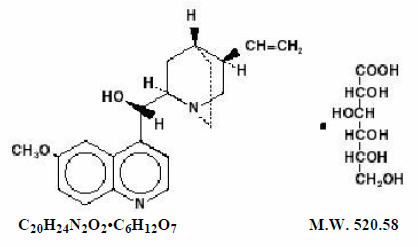
quinidine [kwin-i-deen, -din] ExamplesWord Origin noun Pharmacology.
- a colorless, crystalline alkaloid, C20H24N2O2, isomeric with quinine, obtained from the bark of certain species of cinchona trees or shrubs, used chiefly to regulate heart rhythm and to treat malaria.
Origin of quinidine First recorded in 1830–40; quin(ine) + -id3 + -ine2 Examples from the Web for quinidine Historical Examples of quinidine
Quinidine yields with chromic acid the same decomposition products as quinine.
Scientific American Supplement, No. 415, December 15, 1883
Various
This reaction is not characteristic of quinine, for with quinidine one gets the same reaction.
Cooley’s Practical Receipts, Volume II
Arnold Cooley
Dr de Vrij, for instance, found sometimes more than 20% of quinidine in some samples of quinoidine of commerce.
Cooley’s Practical Receipts, Volume II
Arnold Cooley
From the above statement respecting the solubility of quinidine in ether, it appears that the 10 gr.
Cooley’s Practical Receipts, Volume II
Arnold Cooley
If this be quinidine, it will be dissolved on the addition of proportionately more ether, while cinchonine will remain unaffected.
Cooley’s Practical Receipts, Volume II
Arnold Cooley
British Dictionary definitions for quinidine quinidine noun
- a crystalline alkaloid drug that is an optically active diastereoisomer of quinine: used to treat heart arrhythmias. Formula: C 20 H 24 N 2 O 2
quinidine in Medicine quinidine [kwĭn′ĭ-dēn′] n.
- A colorless crystalline alkaloid that is a stereoisomer of quinine and is used as a treatment for malaria and cardiac arrhythmias.
 Liberal Dictionary English Dictionary
Liberal Dictionary English Dictionary